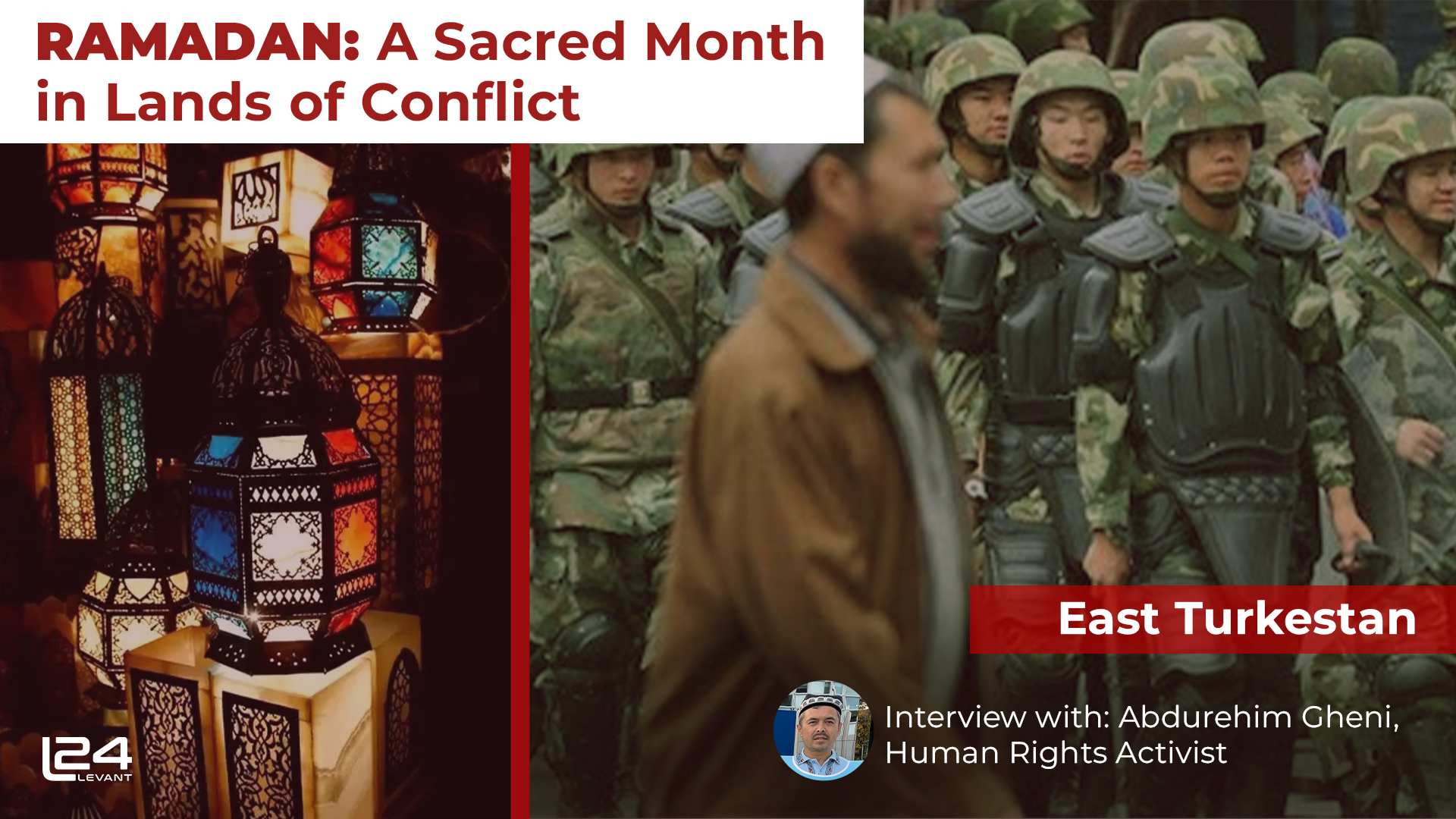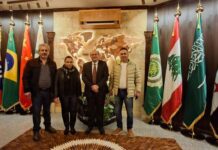An Interview with Abdurehim Gheni, Human Rights Activist

In 1949 East Turkestan came under Chinese communist control. Under Chinese rule, the Uyghur identity and culture have faced suppression, leading to ongoing resistance against occupation. While Chinese policies targeting Uyghur identity have sparked international concern little progress has been made to confront the Uyghur genocide, including mass detentions in “reeducation centers” and concentration camps alongside extreme religious and cultural suppression. L24 spoke with Abdurehim Gheni, a Dutch Uyghur human rights activist about the situation of Uyghurs in occupied East Turkestan. Nineteen members of his family, along with millions of other Uyghurs, have been imprisoned in China’s concentration camps in East Turkestan.
_______________________________
L24: Can you speak about the current situation for the Muslims in East Turkestan?
Abdurehim Gheni: “The situation of the Uyghurs, a predominantly Muslim, Turkic-speaking ethnic group residing in East Turkestan (also known as Xinjiang), remains extremely dire. Their very existence is on the brink of extinction due to an ongoing genocide that began in 2017, on the pretext of curing ‘Islamic viruses in their minds.’
Since that year, the Chinese colonial government has imprisoned millions of Uyghurs and other Turkic Muslims, including Kazakhs, Kyrgyz, Uzbeks, Tatars, and others, in concentration camps. Those who have not been detained face relentless surveillance, religious restrictions, forced labor, forced sterilizations, and forced inter-racial marriages with Han Chinese individuals (mostly Uyghur females with Han Chinese males).
A vast network of reeducation camps have been established, where Uyghurs are held against their will and subjected to unimaginable crimes against humanity. These include forced confessions, organ harvesting, systematic rape, torture, deaths, and disappearances. The existence of these camps has raised international concern and prompted scrutiny; however, China has not accepted any accountability for its crimes against humanity and genocide.

Some of the camp inmates have been transferred to slave labor factories, where they are exploited for the economic gains of international corporations such as Tesla, Nike, Adidas, and others. Outside the camps, the Uyghur population lives in a surveillance prison, constantly monitored by countless facial recognition cameras. This digital dystopia instills fear in their daily lives, as they are at risk of being arrested and sent to a camp at any given moment, for any reason. Unsurprisingly, this has led to a severe mental health crisis among the Uyghur community.
Tragically, approximately one million Uyghur children have been left orphaned, losing their parents either to the camps or to slave labor factories. These children are placed in state-sponsored orphanages and boarding schools, where they are subjected to indoctrination aimed at eradicating their Muslim identity and forcing them to embrace Chinese culture.
Numerous countries, including the US, have criticized China for committing genocide in East Turkestan. Human rights organizations like Amnesty International and Human Rights Watch have publicly condemned these atrocities. The Uyghur community is deeply concerned about the preservation of their cultural heritage, religious traditions and institutions, and national identity, as they believe that government actions aimed at religious leaders, religious activities, and sacred sites are endangering their way of life. In essence, the situation in East Turkestan is extremely dire, as the Uyghurs are enduring a relentless campaign of cultural and ethnic eradication.”
L24: What was Ramadan like in East Turkestan, before the Chinese occupation, what does it mean to Uyghurs and how do you normally observe the blessed month and Eid? How have things changed since the Chinese occupation?
Abdurehim Gheni: “Ramadan holds great significance in the Islamic faith, as it is a sacred month marked by fasting, prayer, and various religious practices. Prior to the arrival of Chinese colonialism in 1949, Uyghur communities faithfully observed Ramadan in accordance with Islamic principles and traditions.
“Each Uyghur city in East Turkestan had its own religious authorities, who oversaw the observance of Ramadan and played a vital role in coordinating religious activities. The Eidgah Great Mosque in Kashgar, the largest mosque in East Turkestan, served as a central hub for these practices.
“In addition to their religious observances, Uyghurs also had their own religious courts that operated under sharia law (Islamic jurisprudence), handling criminal cases and other offenses. However, with the advent of Chinese colonial rule, these Islamic courts were abolished and replaced with civil laws.

“The role of mosques was significantly diminished, limited to facilitating daily prayers for Uyghur Muslims. Furthermore, religious schools affiliated with mosques and other Islamic institutions were banned.
“During the Cultural Revolution, the practice of Islam among Uyghurs faced severe restrictions, with some Uyghur communities even being prohibited from practicing their faith and instead forced to engage in activities contrary to their religious beliefs, such as raising pigs. The Chinese communist regime, promoting atheism, actively encouraged Uyghurs to abandon their religious convictions. Uyghurs who wished to join the Chinese Communist Party were required to renounce their religious affiliations, leading some to forsake their faith.
“However, in the late 1980s, there was a gradual resurgence of Islam among certain Uyghur communities, particularly those in rural and regional areas. This revival can be attributed to the influence of global Islamic movements and the dissemination of Islamic knowledge through advanced communication technologies. Despite the challenges faced by Uyghurs in practicing their faith, the resilience of their religious identity continued to endure.”
L24: What is the most difficult aspect of Ramadan, given the current situation in East Turkestan? How have the people had to adapt or change their normal traditions given the circumstances, are they able to observe the month and celebrate Eid?
Abdurehim Gheni: “Following the 9/11 terrorist attacks in the USA, China took advantage of the situation to associate Islam with terrorism and to brand Uyghur resistance as terrorism. This led to a crackdown on anything related to Islam or Muslim identity, which was labeled as signs of extremism, terrorism, and separatism, which were summed up by Chinese authorities as ‘The Evil Forces.’
“Uyghur religious schools were targeted, with underground schools being heavily punished and teachers arrested. Chinese authorities even went as far as monitoring Ramadan, forcing Uyghurs to drink during fasting hours to prove compliance. Refusal to take the test resulted in arrests and punishments for being uncooperative.

“Since 2017, the restrictions on Ramadan have become even stricter, with a zero-tolerance approach adopted by Chinese authorities. Uyghurs faced severe limitations on observing Ramadan, including being prevented from fasting and forcing Uyghur-owned restaurants to operate as usual.
“Reports indicate that Uyghurs have been coerced into renouncing their faith and embracing the Chinese Communist Party’s ideology. They are compelled to consume pork and alcohol to demonstrate their abandonment of Islam. Some mosques have been destroyed, while others have been repurposed as bars.
“In East Turkestan, there is currently little evidence of Islam being practiced in its truest form, with mosques either being used by the Chinese to deceive the world that Islam is intact and Uyghur are not going through genocide – or the mosques entirely demolished. The Chinese government continues to spread misinformation, falsely claiming that Muslims in Xinjiang can freely observe Ramadan without any restrictions.”
L24: When you look at the situation of the Ummah these days, especially with respect to Ramadan what do you think about the situation of the Muslims? What do you think the solution to the current state of the Muslims is and what should they do during this blessed month to make a difference?
Abdurehim Gheni: “The state of the Ummah, or the worldwide Muslim community, is a multifaceted and distressing one. Currently, there are three devastating genocides taking place in different countries, namely the Uyghur genocide, the Palestinian genocide, and the Rohingya genocide. But they are still ongoing, and Muslims are not able to resolve these tragedies.
“As for the Palestinian genocide, efforts are being made by the US and other international actors to advocate for a ceasefire, particularly with the holy month of Ramadan approaching, in order to alleviate the suffering. However, there are no such efforts for Uyghurs and Rohingyas during this month, which will be as sad as before.
“Moreover, apart from these genocides, Sudan is grappling with its own set of challenges as violence escalates, leading to horrifying violations and abuses. This conflict has resulted in the loss of numerous innocent lives, the displacement of millions of people, and the forced conscription of children, painting a bleak picture of the situation.

“Challenges within the Ummah are many; Internal divisions within the Islamic world are evident, with certain issues receiving more attention than others. For instance, the Uyghur genocide has not garnered the same level of concern as the Palestinian conflict, highlighting a hierarchy of priorities within the Muslim community.
“The absence of strong Islamic leadership to address the various crises affecting Muslim nations, both collectively and individually, is a significant challenge that needs to be overcome. Many Islamic countries maintain close ties with nations like China and Russia, despite their histories of anti-Islamic actions. This relationship has led to a reluctance to address issues such as the Uyghur genocide, viewing China as a potential alternative global power.
“Islamic nations are increasingly seeking involvement in initiatives like the BRICS and the Belt and Road Initiative led by China, further aligning themselves with non-Muslim powers. These trends suggest a concerning shift towards Muslim countries being influenced and controlled by non-Muslim entities, distancing themselves from the realities faced by Muslims worldwide. Despite their economic wealth, Muslim nations struggle to assert significant influence on the global stage, highlighting a disparity between their financial resources and their impact on international affairs.
“The Ummah faces internal hurdles as well, with internal conflicts and power struggles causing disruptions in the governance of certain countries with Muslim-majority populations, ultimately hindering their ability to cater to the needs of the Muslims effectively and meaningfully in a global context.
“However, amidst these challenges, there is a glimmer of hope as conversations continue to take place fostering a sense of global unity within the Ummah as a matter of urgency. The ongoing Uyghur genocide serves as a crucial test to determine the authenticity and strength of this solidarity, prompting discussions on how to address and combat such atrocities.”








